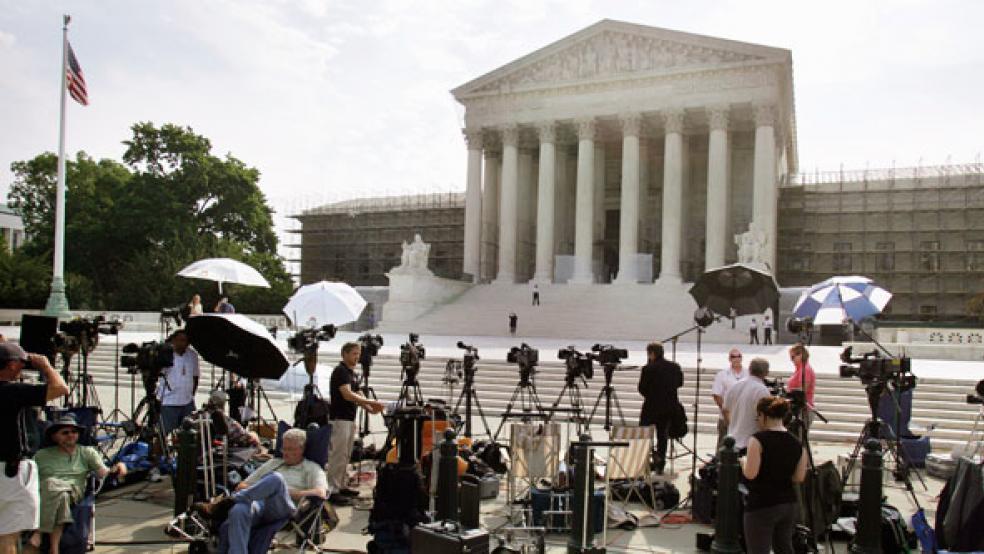As Obamacare’s latest Supreme Court case looms, new questions are surfacing about whether the four plaintiffs actually have standing to challenge the law’s federal subsidies in a high stakes suit that threatens to deny tax credit to some 6 to 8 million people.
The now infamous case of King v. Burwell questions whether income-eligible people who purchase coverage in the 34-states that rely on the federal exchange can legally receive federal subsidies to help pay for their health insurance.
Related: Obamacare Could Go Back to the Supreme
Plaintiffs in the case say the law’s explicit language only provides subsidies to people who buy coverage on state-run exchanges, not the federal portal. The Obama administration, meanwhile, says drafters of the law intended federal subsidies to be available to anyone who qualifies, regardless of which exchange they used to enroll.
The high profile case has received waves of media coverage, since the Court’s ruling will have an enormous impact on the health care law and the millions of Americans who have received coverage because of it.
Until this week, however, very little has been revealed about the four plaintiffs behind the challenge. Now, new information trickling in about each plaintiff raises questions over whether they have standing in the case that will be heard by the Court in March. Plaintiffs need to prove standing by showing they are directly affected by whatever they are challenging.
In this case, the plaintiffs say they are personally affected by Obamacare ‘s individual mandate requiring Americans to have health insurance or pay a penalty. King’s complaint filed in 2013, said since he was “not eligible for health insurance from the government or any employer” the law would directly affect him and his “financial strength” because he would now be required to buy coverage or pay a fine.
Related: Court Challenges Threaten Obamacare Subsidies
But according to a report by The Wall Street Journal on Friday, King and Douglas Hurst, another plaintiff in the case, are veterans that both qualify for free federal veteran's medical coverage through the Veterans Affairs department. Since both men have access to health coverage, they wouldn’t have to buy insurance or pay a penalty. Legal experts immediately seized on the finding and questioned whether they had a legitimate case for standing.
“If they already have access to free health care as vets, they would seem to have no injury,” American University law professor Amanda Frost told The Journal. She also noted that their status as veterans questions whether their lawyers actually vetted the plaintiffs before taking on the case.
Others, namely the organization behind the entire case, the Competitive Enterprise Institute, argued that their veteran’s status doesn’t matter since they aren’t enrolled in the program.
"Since neither Mr. King nor Mr. Hurst had even enrolled, neither was 'eligible' for veterans health care," CEI general counsel San Kazman said in a statement, according to Politico. "Further, there are also non-veteran plaintiffs in this case whose standing is uncontested by the Department of Justice, and so the veteran status of two plaintiffs is of no legal consequence in any event."
Related: Will the Supreme Court Help the GOP Repeal Obamacare?
However, King and Hurst aren’t the only plaintiffs called into question.
Reports suggest that the two others may also have trouble proving that the law is directly affecting them.
Rose Luck, for example, earns an annual income low enough to qualify her for an exemption from Obamacare’s penalty under one of some 30 different exemptions under the ACA.
That means she wouldn’t be required to buy coverage or pay a fine if she went without coverage. And on top of her exemption from the mandate, The Journal reported that Luck had listed a short-stay-motel as her residence on her official complaint that made her eligible to be a plaintiff since the address was in Virginia—a state reliant on the federal exchange. Now it’s likely that Luck’s standing will be questioned.
Lastly, the fourth plaintiff, Brenda Levy, is 64-years old and will turn 65 and become Medicare eligible before the Court rules on the case in June—so the individual mandate won’t apply to her.
Though this new information raises serious questions of standing for each of the four plaintiffs, it’s not likely to derail the case.
Still, it could be an issue. Mark Rust, managing partner at Barnes & Thornburg, LLP in Chicago said the Court could challenge standing right in the middle of oral arguments, though he doesn’t think the issue will realistically get the case dismissed.
“The standing issue to make this case go away is a bit like a hail mary pass,” Rust said. “It is possible (for the administration) to score a touch down with it, but it’s not likely.” He added that it’s “remarkable that those standing issues were not discovered earlier.”
Top Reads from The Fiscal Times





